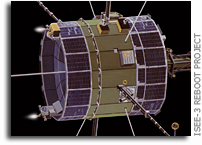 Distributed Rocket Science is a Thing Now, io9
Distributed Rocket Science is a Thing Now, io9
Less than two hours after sending out a distress signal for help, engineers who worked on exactly these types of propulsion systems emerged from the digital wilderness to offer their hard-won experience. What the team learned was a mix of good and bad: solubility probably wasn’t the problem impeding the satellite’s thrusters. Awesome, they don’t need to fix that! Boo, they only have about two or three more options of things that are fixably bad to work on. And if none of those are the problem? Then this will be a glorious, exciting, exuberant failure, and ISEE-3 will continue on its orbit about the sun, leaving us behind once more. Good luck, team. We’re cheering for you.
Volunteer engineers struggle to get ISEE-3 back in gear, The Space Reporter
Attempts to shift the craft’s trajectory began on Tuesday, but ISEE-3 failed to accelerate. The team first thought that the craft suffered from a stuck valve, but after investigating further, they began to suspect that it did not have enough nitrogen left to provide pressure to its fuel system. If the team is unable to change ISEE-3’s course, then the craft will fly around the moon on August 10 before resuming its orbit around the sun. The volunteer engineers look to gain more information about the craft’s condition during Friday’s radio communications session. Even if they fail to bring ISEE-3 into a stable orbit, the team still hopes to use it for scientific purposes while it is in the inner solar system.
The Tale of a Vintage Spacecraft That’ll Never Make it Home, Discover
So we’re left with the question “Is it better to have tried and failed than not to have tried at all?” Cowing seems to think so. As he told SpaceNews on July 9, “We did stuff that was widely seen as impossible, improbable, and impractical. You need to focus on the absurd things that are possible.” And it’s focused minds on the usefulness of the past. The relentless advancement of technology is good for Mars rovers and Netflix streaming speeds, but it also means we abandon still-useful gadgets. And magnetic readings from the sun are magnetic readings from the sun, whether they come from a silicon-encrusted modern craft or a disco-era one.